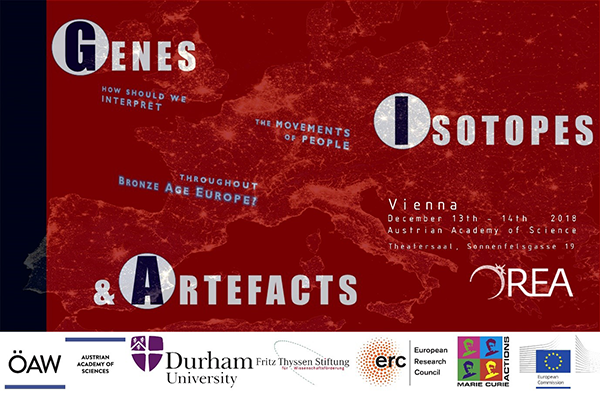Date: Thursday 13th December 2018 – Friday 14th December 2018
Venue: Austrian Academy of Sciences, Theatersaal, Sonnenfelsgasse 19, 1010 Vienna, Austria
Conference organisers: Benjamin Roberts, Claudio Cavazzuti (Department of Archaeology, Durham University), Katharina Rebay-Salisbury (OREA, Austrian Academy of Sciences)
This conference arises from the recent and rapid advances in genomic, isotope and archaeological research that have provided complex, but frequently contradictory, perspectives on human mobility across Bronze Age Europe (2200–800 BC). Human mobility in European prehistory has traditionally been identified through artefacts rather than people. Interpretations of movement have frequently drawn upon distribution maps of artefact types across the continent or changes in recurring artefact assemblages in graves and settlements that underpin archaeological cultures. Post-modern sociological and anthropological theories on human mobility have inspired new theoretical foundations in which archaeologists understand movement by focussing on “routes instead of roots”.
Recent technological developments in genomic sequencing and isotope analysis on teeth/bones have meant that debates concerning mobility have now shifted to direct evidence from humans (and animals). In addition, scientific developments in archaeological materials have enabled new perspectives on production and trade. Network analyses, which draw upon these and other new avenues of data, are starting to transform the Bronze Age map from a mosaic of static archaeological cultures to a mobile world of inter-dependent polities.
The aim of the conference is to identify the different scales, patterns and societal impacts of mobility throughout Europe. This international event will bring together leading scholars from all parts of the continent and research fields tackling similar problems with different methods rooted in the humanities and natural sciences. As an inter-disciplinary forum, this event will provide room for networking and discussions to lay the theoretical and methodological foundations for future scientific advancement.
Participants include Morten Erik Allentoft, Andrea Cardarelli, Claudio Cavazzuti, Edward Caswell, Peter Clark, Karin Margarita Frei, Catherine Frieman, Mario Gavranović, Jelena Grujić, Wolfgang Haak, Johannes Krause, Anthony Harding, Barbara Horejs, Reinhard Jung, Viktória Kiss, Corina Knipper, John Koch, Kristian Kristiansen, Gabriella Kulcsár, Anne Lehoërff, Andrew Millard, Janet Montgomery, Ron Pinhasi, Miljana Radivojević, Katharina Rebay-Salisbury, David Reich, Martin Sikora, Philipp Stockhammer, Benjamin Roberts, Natalia Shishlina, Robin Skeates and Marc Vander Linden.
https://www.orea.oeaw.ac.at/veranstaltungen/event-detail/article/genes-isotopes-and-artefacts/
 Go back to top
Go back to top